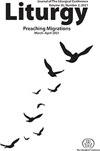Moving Forward: Liturgical Transformations in the Roman Catholic Church
IF 0.3
0 RELIGION
引用次数: 0
Abstract
The Hebrew Bible contains a story of the Israelites’ liberation from Egyptian captivity. Discouraged by dangerous trials on their journey to the Promised Land they became angry with God. Many wanted to return to Egypt where, although enslaved, they had food and housing. Others stood still, tired and fearful of the future. A remnant, undaunted by the probability of hazards ahead, moved forward in search of liberty. A similar situation exists in many places around our world today where there is restlessness and unpredictability. Totalitarian governments are preventing powerless people from moving forward with their lives. Millions of children, women, and men everywhere are stuck; held in modern slavery of some form. In search of future opportunities their dreams have turned to nightmares. The scenario is the same in many Christian faith communities. Not sure of what the future holds for them some are at a standstill. They are fractured over intramural issues such as ministerial roles, scandals, socio-political divisions, dwindling congregations, and prayer book formularies. Even brave pastoral leaders are not sure how to move forward in the face of dire forecasts. The old road maps are worn out. While many Christian denominations throughout the United States are thriving, others are experiencing decline. Recent projections from the Pew Research Center “indicate the U.S. might be following the path taken over the last 50 years by many countries in Western Europe that had overwhelming Christian majorities in the middle of the 20th century and no longer do.” Although there will always be new converts to Christianity, the Pew study indicated that “religious commitment could steadily weaken from generation to generation if people continue to identify as Christian but are less devout than their parents and grandparents.” Many in the X, Y and Z generations no longer go to church. According to one study, “The secularization of culture may impact religious belief, with greater value placed on the immanent, observable, and directly experience-able than on a transcendent worldview where mystery and trust in the unknowable are accepted. Millennials, for example, believe they can be spiritual and socially conscious without the constraints of pontificating clergy and catechetical ennui. “Broken promises, fallen leaders and exposed corruption have led Millennials to feel alienated from oncefoundational institutions.” Organized religions are among those establishments. Researchers claim structural clericalism, a self-righteous form of entitlement, is at the core of the problem in the Catholic Church. As theologian Massimo Faggioli observed, tensions have erupted into “the storm that the Catholic Church is going through today – the battle between前进:罗马天主教会礼仪的转变
《希伯来圣经》中有一个以色列人从埃及人的囚禁中解放出来的故事。在前往应许之地的旅途中,他们被危险的审判所挫败,对上帝感到愤怒。许多人想回到埃及,在那里虽然被奴役,但他们有食物和住房。其他人站着不动,对未来感到厌倦和恐惧。一个残余分子对前方可能发生的危险无所畏惧,继续前进,寻求自由。今天,在我们世界的许多地方也存在着类似的情况,那里存在着不安和不可预测性。极权主义政府正在阻止无能为力的人们继续他们的生活。世界各地数以百万计的儿童、妇女和男子被困;被某种形式的现代奴役。为了寻找未来的机会,他们的梦想变成了噩梦。许多基督教社区的情况也是如此。不确定他们的未来,有些人停滞不前。他们在内部问题上意见分歧,如部长角色、丑闻、社会政治分歧、会众减少和祈祷书配方。即使是勇敢的牧民领袖也不知道如何在可怕的预测面前前进。旧的路线图破旧不堪。尽管美国各地的许多基督教教派都在蓬勃发展,但其他教派却在衰落。皮尤研究中心(Pew Research Center)最近的预测“表明,美国可能正在遵循西欧许多国家在过去50年中所走的道路,这些国家在20世纪中叶拥有压倒性的基督教多数,现在已经不再这样了。”,皮尤研究中心的研究表明,“如果人们继续认同自己是基督徒,但不如父母和祖父母虔诚,那么宗教承诺可能会一代又一代地逐渐减弱。”许多X、Y和Z世代的人不再去教堂。根据一项研究,“文化的世俗化可能会影响宗教信仰,与接受神秘和对未知事物的信任的超验世界观相比,对内在的、可观察的和直接的经验能力的重视更大。例如,千禧一代相信,他们可以在没有教条主义神职人员和宗教厌倦的约束下,具有精神和社会意识。“失信、领导人倒台和腐败暴露让千禧一代感到与曾经的基础机构疏远。”有组织的宗教就是其中之一。研究人员声称,结构性神职人员主义,一种自以为是的权利形式,是天主教会问题的核心。正如神学家马西莫·法焦利所观察到的那样,紧张局势已经爆发为“天主教会今天正在经历的风暴——
本文章由计算机程序翻译,如有差异,请以英文原文为准。
求助全文
约1分钟内获得全文
求助全文

 求助内容:
求助内容: 应助结果提醒方式:
应助结果提醒方式:


